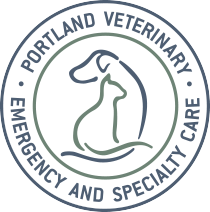Hiking with your dog in Maine’s forests and coastal trails can be one of the most fun summer experiences. But along the way, dogs are known for sniffing, licking, and sometimes swallowing things they should not, whether it is a plant, mushroom, or piece of discarded food. If your dog ate something unknown during a hike, quick thinking and prompt action can protect their health and even save their life.
This guide outlines what to do if your dog ingests a questionable item outdoors, what details to collect, and when to seek help from your veterinary team.
Common Hazards Dogs May Ingest on Trails
While Maine’s natural beauty draws outdoor enthusiasts year-round, wooded and coastal hiking trails can hide serious risks for pets. Here are some of the most common ingestion dangers:
- Wild mushrooms, which may be toxic or hallucinogenic
- Berries and plants, such as foxglove, lily of the valley, or nightshade
- Insecticides or rodent bait, especially near campsites or parking areas
- Trash or discarded food, including bones or wrappers
- Animal feces or carcasses, which may carry parasites or harmful bacteria
Certain wild mushrooms and plants are especially toxic and can lead to mushroom poisoning in dogs, with symptoms appearing within hours of ingestion.
Signs Your Dog May Have Ingested Something Harmful
Symptoms of toxic ingestion vary based on the substance, but common warning signs include:
- Vomiting or diarrhea
- Drooling or foaming at the mouth
- Lethargy or weakness
- Disorientation or trembling
- Seizures
- Pale gums
- Abdominal pain or bloating
If you notice these symptoms or even suspect your dog swallowed something unknown, it is important to act quickly. Delaying treatment can allow toxins to spread and reduce the chances of recovery.
What to Do Immediately if Your Dog Eats Something Unknown
When you are out on a trail or away from home, time and information become critical. Follow these steps to respond effectively:
1. Stay Calm and Prevent Further Ingestion
Gently move your dog away from the area and do not allow them to return to the item. Try to keep them still and calm while you assess the situation.
2. Do Not Induce Vomiting Without Veterinary Advice
Some substances can cause more harm if vomited. Always call your veterinarian or an emergency clinic for guidance before taking action.
3. Document What Was Ingested
If possible, take photos of the plant, mushroom, wrapper, or item your dog may have eaten. Note the location, time, and any changes in behavior.
4. Save a Sample
If safe to do so, collect a sample of the suspected item. Use a plastic bag or container to store it. This can help veterinary teams identify the substance faster.
5. Call a Veterinary Professional Immediately
Even if symptoms have not started, report the incident to your veterinarian or an emergency animal hospital. Share all the information and photos you gathered.
Why Swift Action Matters
Toxic substances can be absorbed rapidly into the bloodstream, making early treatment essential. In many cases, success depends on acting before the toxin has fully taken effect.
Some poisons, such as certain mushrooms, may appear harmless at first and then cause liver failure hours later. In these cases, supportive care, blood work, and specialized medications may be required to prevent long-term damage.
If you are unsure whether your pet is in danger, it is always best to err on the side of caution and consult a professional.
Learn more about our 24/7 Emergency and Critical Care services here.
Back on the Trail with Peace of Mind
Exploring Maine’s trails with your dog is one of summer’s greatest joys, but safety should never take a back seat. If your dog ate something unknown, taking the right steps early can make all the difference. From poisonous plants to foreign objects, understanding what to watch for and when to act helps protect your pet from preventable harm.
At Portland Veterinary Emergency and Specialty Care, our internal medicine specialists and emergency care team are ready to provide fast, expert support. Whether you are navigating a potential pet emergency or seeking answers about toxic exposure, we are here to help every step of the way.

